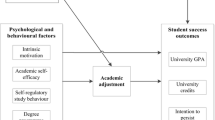Abstract
Importance ratings of reasons for attending college were obtained from male and female undergraduates. Responses were compared for sex differences and were compared to the responses of subjects in the Constantinople (1967) study. The picture of college students that emerged is very different from those of previous studies. Current females did not emphasize career goals less, nor social goals more, than males. Current males were more interested in social aspects of college than were their male predecessors. Male and female concepts of success seemed to differ. To females challenge and accomplishment were most important; to males, complying with parental pressures and economic success were most important.
Similar content being viewed by others
References
Booth, A. Sex and social participation. American Sociological Review, 1972, 37, 183–194.
Busnell, J. H. Student culture at Vassar. In N. Sanford (Ed.), The American College. New York: Wiley, 1962. Pp. 498–514.
Constantinople, A. Perceived instrumentality of the college as a measure of attitudes towards college. Journal of Personality and Social Psychology, 1967, 5, 196–202.
David, D. S. Career patterns and values: A study of men and women in science and engineering. New York: Columbia University Press, 1972.
Lynne, D. Parental and sex role identification: A theoretical formulation. Berkeley, Calif.: McCutcham Publishing, 1969.
Rappaport, A. F., Payne, P., & Steinmann, A. Perceptual differences between married and single college women for the concepts of self, ideal women and man's ideal women. Journal of Marriage and the Family, 1970, 32, 441–442.
Sexton, P. C. Women and work (R & D Monograph 46). Washington, D.C.: U.S. Dept. of Labor, 1977.
Singer, J. N. Sex differences-similarities in job preference factors. Journal of Vocational Behavior, 1974, 5, 357–365.
Singer, S. L., & Steffle, B. Sex differences of job values and desires. Personnel and Guidance Journal, 1954, 32, 483–584.
Tresemer, D. The cumulative record of research on “fear of success.” Sex Roles, 1976, 3, 217–236.
Voss, J. H., & Skinner, D. A. Concepts of self and ideal women held by college women: A replication. Journal of College Student Personnel, 1975, 16, 210–213.
Wagman, M. Sex and age differences in occupational values. Personnel and Guidance Journal, 1965, 44, 258–262.
Author information
Authors and Affiliations
Additional information
The authors thank Phillip Shaver for his helpful comments on an earlier version of this article.
Rights and permissions
About this article
Cite this article
Goldberg, A.S., Shiflett, S. Goals of male and female college students: Do traditional sex differences still exist?. Sex Roles 7, 1213–1222 (1981). https://doi.org/10.1007/BF00287973
Issue Date:
DOI: https://doi.org/10.1007/BF00287973




